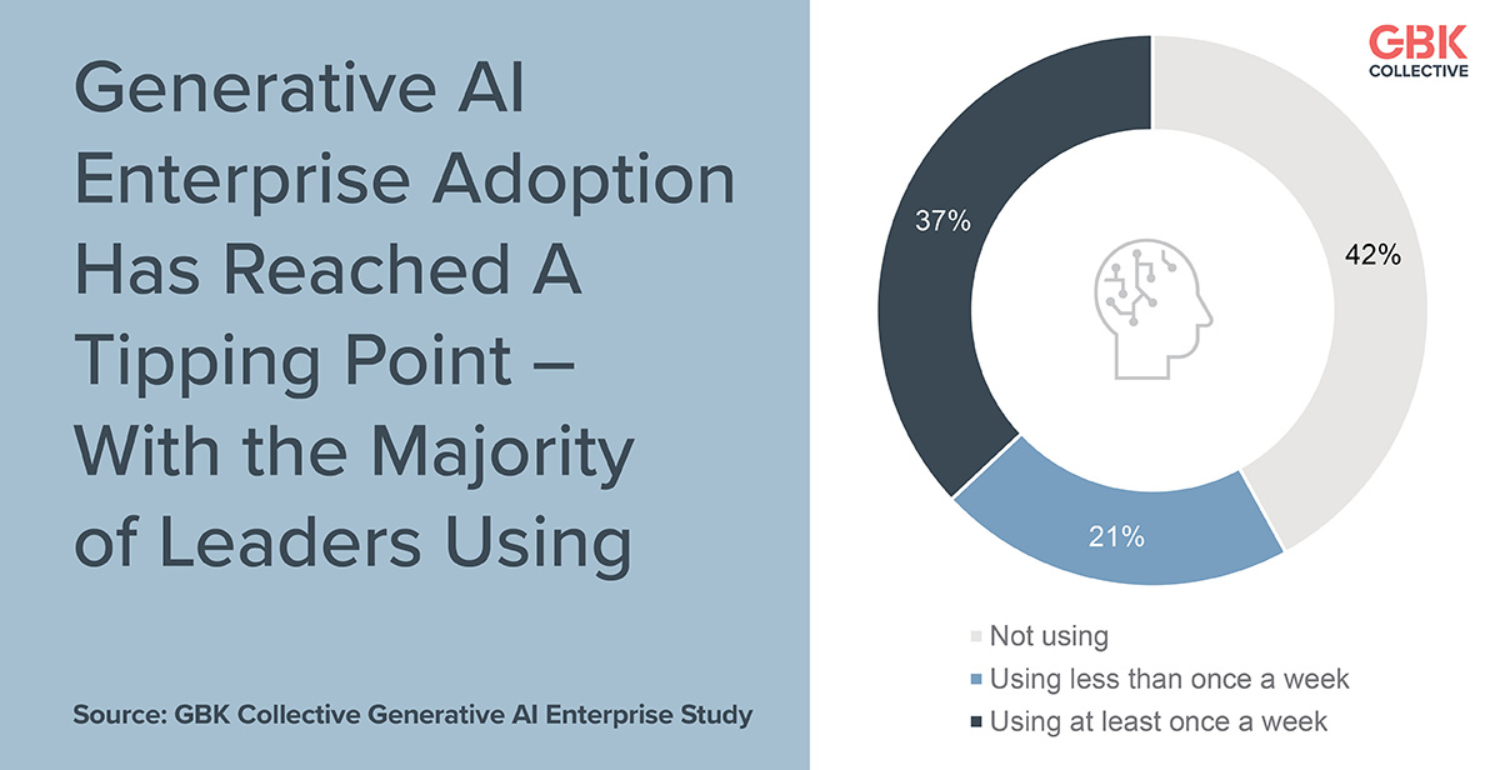Insider Brief
- A GBK Collective study reveals that generative AI adoption within enterprises has reached a tipping point, with a majority of enterprise leaders already using generative AI and planning to increase investments by over 25% in the next year. The survey, conducted with 672 senior U.S. leaders, offers insights into generative AI usage by industry, adoption drivers, and barriers.
- While 37% of enterprise leaders use generative AI weekly and 81% have a dedicated team for it, concerns around accuracy, bias, and AI’s role in decision-making persist. Still, most see AI as augmenting rather than replacing human talent, and foresee its broad use for data analysis, marketing content creation, and customer insights.
- Industries currently lagging in generative AI adoption, such as Retail and Professional Services, anticipate significant investment growth. The study suggests varied priorities for generative AI investments based on company size, highlighting the different strategic challenges faced by companies of varying scales.
PRESS RELEASE — NEW YORK/October 12, 2023 — (BUSINESS WIRE) — A new study by GBK Collective, a leading marketing strategy, insights and analytics consultancy, shows that generative AI adoption has reached a tipping point within enterprises. Not only do the majority of enterprise leaders now use generative AI — they are also planning a substantial increase in generative AI investments in the next 12 months.
Conducted with 672 senior leaders from U.S. enterprises, each with annual sales surpassing $50 million, the survey also offers some eye-opening insights on the adoption of generative AI by functional area, emerging applications and use cases by industry, as well as adoption drivers and barriers.
The comprehensive report was directed by AI expert Dr. Stefano Puntoni, Sebastian S. Kresge Professor of Marketing at The Wharton School and Faculty Co-Director of AI at Wharton, and Jeremy Korst, former technology executive at Microsoft and T-Mobile and now President of GBK. Dan Ives, Managing Director of Equities Research at Wedbush Securities, also collaborated on the report.
[THE RISE OF GENERATIVE AI ACROSS ENTERPRISES -> CLICK HERE TO DOWNLOAD FULL REPORT]
“The results of our study show that we’ve passed a critical tipping point with Generative AI,” said Prof. Puntoni. “This isn’t another metaverse. Enterprise decision makers across industries are adopting Generative AI in droves and the wave is only going to grow, with spending set to surge by more than 25% in the next 12 months.”
Summary of Insights:
Generative AI Usage Intensity by Industry and Company Size:
According to GBK’s study, the majority of enterprise leaders today have embraced generative AI, with 37% actively using it weekly and another 21% less frequently. Additionally, 8 out of 10 leaders (81%) confirm having an internal team of 10 or more focused exclusively on generative AI strategy.
Interestingly, small enterprises (revenues between $50M-$200M) lead the pack in frequent generative AI usage (57% at least once per week), while the most untapped potential exists among firms exceeding $2B in revenue — most notably in Retail and Manufacturing.
By industry, Technology dominates with 60% of leaders frequently utilizing generative AI, followed by Industrial/Construction and Finance at 43% and 39%, respectively. Conversely, just 26% of leaders in Retail and 36% in Professional Services and Manufacturing engage with generative AI routinely.
“Our study not only shows rapid adoption of generative AI, but varying levels of maturity,” said Korst. “Some organizations are still in the exploratory phase, while others have seamlessly incorporated Gen AI into their daily workflow. We also see significant differences in usage, overall knowledge, and skills related to generative AI by industry and department.”
Triggers and Barriers to Generative AI Adoption
Three in four enterprise leaders have a generally positive outlook on generative AI, yet caution persists among all respondents, but particularly among those who use the technology less frequently.
The primary motivators for adopting generative AI include boosting employee efficiency, optimizing business operations, enhancing employee creativity, development of new products and services, and reaching new audiences or markets.
Conversely, concerns around inaccurate results, customer privacy, internal pushback, ethical issues and cost are the top barriers to adoption. Companies with $50M-$200M in revenue worry most about data confidentiality, with accuracy being the top concern cited by firms with revenue of $2B+ annually.
“While optimism about generative AI is prevalent, concerns around accuracy, bias, and AI’s role in decision-making remain,” shared Prof. Puntoni. “Additionally, there’s an underlying psychological concern by leaders around job replacement, especially among those who have yet to use the technology. As generative AI becomes increasingly ingrained across teams, striking the right balance with AI governance and employee education will be pivotal.”
Will Gen AI Replace or Augment Human Talent?
For the moment, the study shows that generative AI is seen as more beneficial to employees than detrimental. Senior leaders currently using the technology are more likely to state that generative AI will enhance employee skills versus replace them (48% vs. 36% strongly agree).
Moreover, most enterprise leaders don’t believe the technology can completely substitute human talent. It can, however, improve work quality (55% strongly agree that AI will enable higher quality with the same employees vs. 43% who strongly agree but with fewer employees).
“Generative AI, while revolutionary, is not immune to errors,” said Korst. “It’s crucial for leaders to have strong quality control mechanisms in place to monitor and validate AI-generated output from data analysis to content. This not only ensures accuracy but helps to mitigate risks and maintain the integrity of the brand.”
Investments in Gen AI Poised to Surge
Despite the risks and challenges, investment in generative AI is on track for significant growth with companies across industries planning to increase investments by 25% in the next 12 months led by firms with revenues exceeding $2B (which plan a 28% uptick in spend). Industries currently lagging in generative AI adoption, such as Retail and Professional Services, anticipate the most significant investment increases, with projected growth rates of 27% and 28%, respectively.
Emerging Applications and Use Cases
“Use cases for generative AI continue to explode with enterprises across industries now viewing AI as a major strategic initiative in the coming years,” commented Dan Ives, Managing Director at Wedbush Securities and a collaborator on the report. “We continue to view AI as the most transformational tech trend since the birth of the Internet in 1995.”
When asked what use cases and applications would be most prominent for generative AI, enterprise leaders overwhelmingly point to a future where these AI models become indispensable co-pilots in the workplace. In the next 3–5 years, decision-makers across the board agree that generative AI will be broadly used for generating data analysis (89%), marketing content and creation (text, images, video) (87%), as well as researching customer & competitive insights (84%).
Other top applications include document editing and summarization (84%), customer support or internal help desk functions (82%), and automated email generation (82%). The least popular uses for generative AI are expected to be legal contracts (57%), recruitment (67%) and supply chain management (71%).
“The results of our survey show a dynamic future for generative AI, with investment and applications expanding rapidly,” notes Prof. Puntoni. “And yet not all approaches are created equal. While AI can analyze mountains of data in seconds, human oversight and asking the right questions is vital to ensure accurate and responsible use of AI-generated outputs.”
In some cases, generative AI investments will be prioritized differently depending on the size of the firm. Smaller firms ($50M-$200M) are heavily investing in generative AI for sales content (91%), while mid-sized companies ($250M-$2B) focus more on email generation and internal support (86%). This reflects not just varied priorities, but also the unique strategic challenges faced by companies of different sizes.
About GBK Collective:
Born from academics. Enlightened by data-driven research and analytics. GBK Collective is a leading marketing strategy, insights and analytics consultancy built to solve marketing problems in high definition. Co-founded by the Vice Dean of Analytics and Chair of Wharton’s Marketing Department, GBK applies industry leading academic expertise and real-world corporate experience to every project with clients to deliver practical and actionable solutions to real issues. For more information, please visit www.gbkcollective.com.
Contacts
David Henderson
StoryBound Communications
[email protected]
425–829–5971
Featured image: A new study by GBK Collective and Dr. Stefano Puntoni, Director of AI at Wharton, shows that generative AI adoption has reached a tipping point within enterprises. Not only do the majority of enterprise leaders now use it — they are also planning a substantial increase in generative AI investments in the next 12 months. (Graphic: Business Wire)






